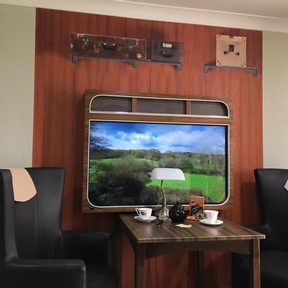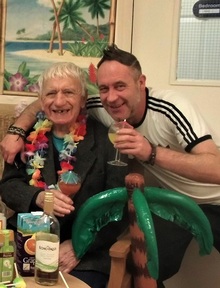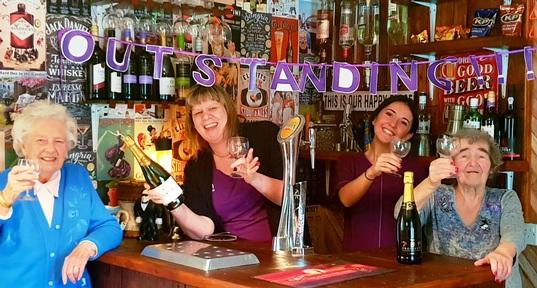Dragons' Den entrepreneur takes people with dementia back in time with interactive train carriages
An entrepreneur, who managed to win a £100,000 deal on the TV show Dragons' Den, has added to his reminiscence tools for people with dementia, with an interactive train carriage and laundrette.

Richard Ernest secured the deal on the TV show a few years ago, giving away 45 per cent of his company to the two Dragons, Deborah Meaden and Peter Jones.
Mr Ernest who admits that going on Dragons' Den was “one of the scariest things I have ever done” describes RemPods as pop up reminiscence rooms, which work by turning any clinical care space into a therapeutic and calming environment, stimulating memories in people with dementia. The pods range from a 1950s room to a vintage store, a dance hall and a cinema.
Reminiscence rooms are becoming increasingly popular in care homes as they have found that dementia patients often feel more safe and secure when they are remembering their past and it can trigger memories of happier times improving behaviour and wellbeing and reducing the need for anti-psychotic drugs. These reminiscence pods work in the same way but can be packed away.
'These spaces can become magical places'
Mr Ernest has now devised a steam train carriage that takes people back in time and on a journey through their local landscape, saying: “Every time I visit a care home, or hospital ward I see unused corners and spaces. With a little imagination these spaces can become magical places for people with dementia.
“We know that we can’t cure dementia, but with this cutting edge concept we can help to improve lives.”
The train carriage comes with a wallpaper backdrop and a replica, framed window, surrounding an LCD screen. The screen plays hours of real, scenic footage of a journey through the countryside. A vintage tea set and replica 1950s ‘iSpy on a Train Journey’ book completes the scene. Mr Ernest claims it can “increase food and fluid intake and prompt conversation”.
James Macleod, customer relations manager at Scarlet House care home in Stroud, which has the interactive train carriage has found the residents use it daily and said: “We serve residents and relatives with an old fashioned afternoon tea on their journeys. This adds to the wellbeing of the residents in helping them remember times gone by.”
“If they are in a situation where they might be anxious, reminiscing with them is like a diversional therapy and it brings a calmness to them and a sense of well-being.”
Launderette
Mr Ernest has also come up with the concept of a launderette, which has a slim-line wooden case designed to look and feel like a pair of 50s coin-operated laundry machines.
“With doors that open and close, residents can take clothes out and fold away helping them to feel integrated back into their social life. A scent machine gives that authentic smell of wash day,” he said.
When Richard Ernest went on Dragons' Den, Deborah Meaden revealed that she decided to invest because Mr Ernest “came over as credible, passionate and clear and with the ‘Person’ box ticked I concentrated on questions around the product and the market. I was au fait with some great work done by the Design Council on the effect of surroundings on people with Alzheimer’s so I already understood the positive effect the RemPods could have.
“I could also see the clear routes to market and what we need to do. It wasn’t long before my fingers were going and I knew I would make an offer. In the end Richard accepted a combined offer from Peter and myself.”
Dragons' Den star Peter Jones
Fellow Dragon Peter Jones also backed the concept because “dementia and Alzheimer's are growing problems for the UK and I'm delighted to be involved in a business that offers assistance to the patients suffering from these terrible diseases and the carers who have the responsibility of looking after them. Deborah and I were very impressed with Richard who we believe has the potential to build a successful business with a social conscience.”

Mr Ernest came up with the idea for his RemPods five years ago.
“I had moved to the village of Tetbury and I had lost my job and split up with my partner. I was feeling quite down and this elderly man, who lived nearby, called at my door. I got talking to him and began giving him lifts to the care home where his wife was.
“He became my friend and I used to wait in reception at the care home while he was visiting his wife. While I was waiting I would talk to some of the residents who had dementia and I was struck by how they were often living in the past. From that I got the idea about the reminiscence pods. It was about five years ago and the idea has grown from there.
“I started thinking about care homes that didn’t have reminiscence rooms as they don’t have the space and they can’t afford to spend lots of money so I came up with the idea of the pods. They can always be updated and we have just devised a 70s room for younger people coming into a care home.”
Mr Ernest now has his pods in hundreds of care homes as well as some NHS hospitals.
Latest Innovative Care News
 13-May-19
'Pink drink' brain cancer treatment rolled out across NHS in memory of Baroness Jowell
13-May-19
'Pink drink' brain cancer treatment rolled out across NHS in memory of Baroness Jowell
 25-Apr-19
Louis Tomlinson helps 83-year-old who lost wife to dementia complete bucket list
25-Apr-19
Louis Tomlinson helps 83-year-old who lost wife to dementia complete bucket list
 22-Mar-19
UK's top care home handyman takes residents to pub for pie and pint
22-Mar-19
UK's top care home handyman takes residents to pub for pie and pint
 12-Feb-19
Michael McIntyre's jokes tested to see if they stop elderly catching flu
12-Feb-19
Michael McIntyre's jokes tested to see if they stop elderly catching flu
 07-Jan-19
'We were lucky to find it': Family's delight as care home is rated Outstanding
07-Jan-19
'We were lucky to find it': Family's delight as care home is rated Outstanding